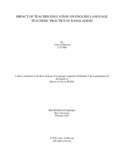Impact of teacher education on English language teachers’ practice in Bangladesh
Abstract
In a developing country like Bangladesh, where English gets little exposure in daily use, teaching English as a foreign language (EFL) or English as a second language (ESL) without any teacher education (TE) is a challenging phenomenon. Surprisingly, a scarcity of research had been found in connecting English language teachers’ struggle in class and the contribution of TE in Bangladesh. This qualitative study attempted to investigate, firstly, the challenges faced by Bangladeshi English language teachers at the tertiary level who did not have any English Language Teacher Education (ELTE) before starting their teaching careers, and secondly, the types of impacts ELTE created on those challenges after the teachers had undergone an ELTE. Following qualitative method, semi-structured interviews with four English language teachers working at different private universities were conducted to collect data. The participants were the English teachers who had experienced at least one ELTE program (TESOL/CELTA).This study applied thematic analysis to evaluate the results. The findings of the study identified challenges regarding teachers’ roles,methods and approaches, developing teaching materials and designing class activities, and providing feedback encountered by Bangladeshi English languages teachers. In time, it figured out that ELTE programs had positive impacts that enabled teachers to overcome those challenges. The study concluded with a note that ELTE programs can be considered as a guide to novice or aspiring teachers in the area of English language teaching (ELT).

